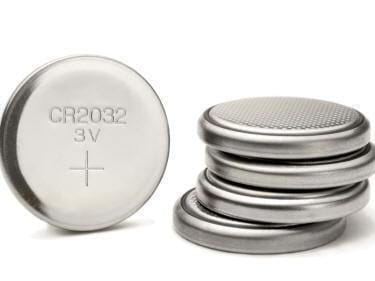Button Batteries Can Kill Children

The Bottom Line
More and more children are being injured, or even dying, from swallowing button or disk batteries. This tragedy can be prevented. Batteries stuck in the esophagus must be removed as quickly as possible as severe damage can occur in just 2 hours. Batteries in the nose or ear also must be removed immediately to avoid permanent damage.

The Full Story
More and more children are being injured, or even dying, from swallowing button or disk batteries. This tragedy can be prevented.
The majority of these severe injuries are from lithium batteries, a little larger than a penny, used to power such household items as remote controls, games and toys, calculators, cameras, computers, shoes, jewelry, thermometers, singing greeting cards, and a wide variety of other items. Lithium batteries are becoming more popular because they last a long time, work better than older batteries in the cold, and fit neatly into slim battery compartments.
If these larger lithium batteries are swallowed, they are more likely than smaller batteries to get stuck in a child's esophagus, on the way down to the stomach. This can cause a burn right where the battery stops. The child may develop severe bleeding, leading to death; tissue injury that requires tube feeding; paralyzed vocal cords; and many other problems that require surgery and long recovery times.
Injury from a battery stuck in the esophagus can begin in only two hours. Removal of the battery in less than two hours is essential – but sometimes there are no symptoms at all right after a battery is swallowed. If the battery remains in place long enough for injury to develop, it can still be hard to figure out the problem. Many of these children are too young to report that they swallowed a battery, and the symptoms mimic many common childhood illnesses: loss of appetite, vomiting, cough, wheezing, and fever.
Tips for Protecting Young Children
- Never leave batteries sitting out. Store spare batteries, and batteries to be recycled, out of sight and reach of young children. If recycling is not possible, wrap used batteries securely and discard them where a child can't find them.
- Check all household devices to be certain the battery compartment is secured shut. Use strong tape to secure compartments that children can open or that might pop open if the device is dropped. Only purchase products that require a screwdriver or tool to open the battery compartment, or that are closed with a child-resistant locking mechanism. Batteries are everywhere. Check all of the following:
- remote controls
- garage door openers
- keyless entry fobs
- bathroom scales
- parking transponders
- toys
- cameras
- watches
- PDAs
- calculators
- digital thermometers
- hearing aids
- singing greeting cards
- talking books & portable stereos
- handheld video games
- cell phones
- home medical equipment/meters
- flash and pen lights
- flashing shoes
- toothbrushes, bedwetting monitors
- keychains
- flashing or lighted jewelry or attire
- any household item that is powered!
- Be especially cautious with any product that contains a battery that is as big as a penny or larger.
- The 20 mm diameter lithium cell is one of the most serious problems when swallowed.
- These problem cells can be recognized by their imprint (engraved numbers and letters) and often have one of these 3 codes: CR2032, CR2025, CR2016.
- If swallowed and not removed promptly, these larger button batteries can cause death - or burn a hole through your child's esophagus.
- Don't allow children to play with batteries or with battery powered products that have easily accessible batteries.
- Make sure all hearing aids for children have child-resistant battery compartments and make sure the lock is activated when the child is wearing the aid.
- Alert family members who wear hearing aids to the importance of keeping the batteries out of reach of small children at all times. That can be quite a burden since most hearing aid users remove the batteries from the aids each time they take the aids off.
- Don't insert or change batteries in front of small children.
Tips for Protecting Older Children and Adults
- Never put batteries in your mouth, to test, to hold, or for any reason. They are slippery and easily swallowed.
- Don't mistake batteries for pills. Don't store batteries near pills or in pill bottles. Don't leave them on bedside tables or place them loose in your pocket or purse. Look at every medicine you intend to swallow. Turn on the lights, put on your glasses, read the label and look at the medicine itself.
- If you use a hearing aid, these steps are especially important. All too often, the tiny hearing aid batteries are ingested with or instead of medications.
- Avoid storing or leaving batteries where they might be mistaken for, or swallowed with, food.
- Don't leave batteries in drinking glasses or adjacent to nuts, candy, popcorn or other finger foods.
If a Battery is Swallowed or Placed in the Ear or Nose
Call the National Battery Ingestion Hotline at 800-498-8666 immediately. Prompt action is critical. Don't wait for symptoms to develop. If the battery was swallowed within the prior 12 hours, especially if it might have been a lithium coin cell, and the child is able to swallow, give 2 teaspoons of honey every 10 minutes while going to the ER. Do not delay going to the ER to give honey. Other than honey, don't eat or drink until an x-ray shows the battery is beyond the esophagus. Batteries stuck in the esophagus must be removed as quickly as possible as severe damage can occur in just 2 hours. Batteries in the nose or ear also must be removed immediately to avoid permanent damage.
Rose Ann Gould Soloway, RN, BSN, MSEd, DABAT emerita
Clinical Toxicologist
Swallowed a battery?
Get help from the battery ingestion hotline immediately
CALL 800-498-8666
Prevention Tips
Children MUST be prevented from reaching or handling button batteries. Button batteries, used for any purpose, from toys to hearing aids, MUST be used and stored in a way that prevents children from handling them: lock new batteries away, store used batteries safely, tape up battery compartments that are not child-resistant, and track down any missing batteries right away.
This Really Happened
A 22-month-old boy fell to the bathroom floor, began vomiting blood, and stopped breathing. His family called paramedics. The child died in the emergency room before his x-ray could be interpreted. An autopsy revealed that he had swallowed a large button battery that had lodged in and severely burned his esophagus. He died of internal bleeding. The circumstances and time that the child found and swallowed the battery remain unknown. The family reported that he was acting like himself up until the day he died, except for acting as if he needed more attention than usual.
For More Information
Additional information about how batteries can cause injuries is available at poison.org.
Triage and treatment guideline for button battery ingestions
Additional information about preventing injuries from button batteries is offered by The Battery Controlled.
References
Swallowed a battery?
Get help from the battery ingestion hotline immediately
CALL 800-498-8666
Prevention Tips
Children MUST be prevented from reaching or handling button batteries. Button batteries, used for any purpose, from toys to hearing aids, MUST be used and stored in a way that prevents children from handling them: lock new batteries away, store used batteries safely, tape up battery compartments that are not child-resistant, and track down any missing batteries right away.
This Really Happened
A 22-month-old boy fell to the bathroom floor, began vomiting blood, and stopped breathing. His family called paramedics. The child died in the emergency room before his x-ray could be interpreted. An autopsy revealed that he had swallowed a large button battery that had lodged in and severely burned his esophagus. He died of internal bleeding. The circumstances and time that the child found and swallowed the battery remain unknown. The family reported that he was acting like himself up until the day he died, except for acting as if he needed more attention than usual.
